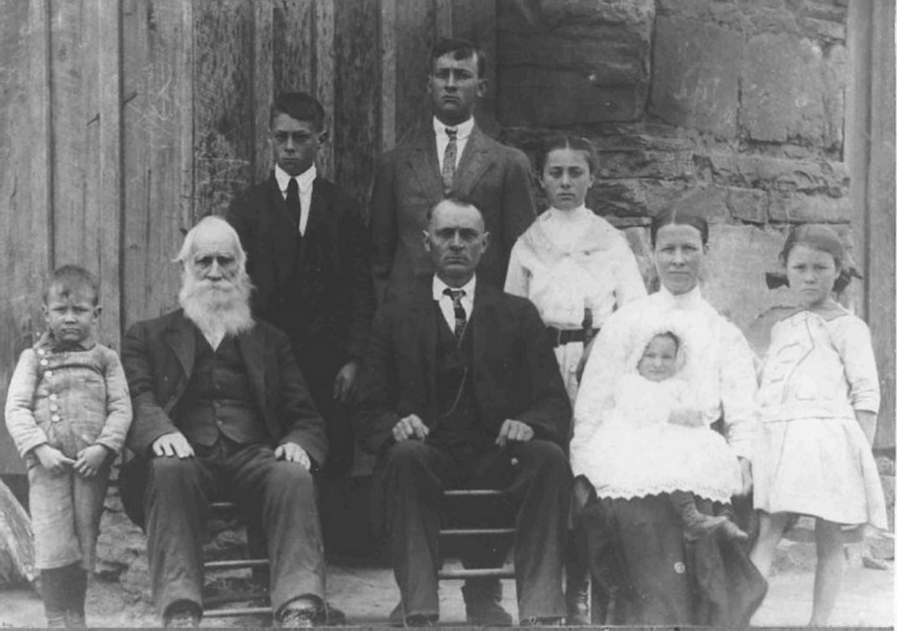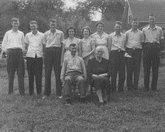|
This list is an ongoing project and far from complete. Annotations are
based on a foundation in regional and local historiography and meant to be a guide in determining
the usefulness and applications of specific works in personal and local research. Aside from the
list of suggested regional history books, listing should not be considered endorsement of any
specific work, only a suggestion that it would be helpful to some people researching Transylvania
County history. As always, researchers should carefully evaluate all sources in relationship to a
specific research topic.
- Linda Hoxit Raxter
Bibliography Sections
 ^ Back to Top ^ Back to Top
Suggested Regional History Books
Blethen, H. Tyler and Curtis W. Wood, Jr. From Ulster to Carolina: The
Migration of the Scotch-Irish to Southwestern North Carolina. Raleigh: North Carolina
Department of Cultural Resources Division of Archives and History, 1998.
Brief account of this important migration route into the region. Note
that the authors will be the first to point out this is only one of many migration patterns.
Discusses important cultural changes associated with regional settlement.
Bush, Francis Cope. Dorie: Woman of the
Mountains. University of Tennessee Press, 1992.
While
this work focuses on the life of one woman primarily in the Great Smokey Mountains, any reader
with a grandmother from the Southern Appalachian region will likely find something familiar in
this account of life during the industrialization of the area.
Eller, Ronald D. Miners, Millhands, and Mountaineers: Industrialization of
the Appalachian South, 1880-1930. University of Tennessee Press, 1982.
Classic work
describing the changes associated with regional industrialization.
Finger, John. The Eastern Band of Cherokees,
1819-1900. University of Tennessee Press, 1984.
Detailed account
of how the eastern Cherokee were able to carve a small place to remain in their mountains.
Finger, John R. Cherokee Americans: The Eastern Band of Cherokees in the
Twentieth Century. Brompton Books Corp, 1993.
Investigation
into the continued challenges of the Eastern Cherokee in adapting to 20th century
regional changes.
Hatley, Tom. The Dividing Paths: Cherokees and South Carolinians
through the Revolutionary Era. Oxford University Press, 1995.
Hatley looks at both the violent and friendly relations between these
two people as both adjusted to changes in the backcountry.
Hill, Sarah H. Weaving New Worlds: Southeastern Cherokee Women and Their
Basketry. University of North Carolina Press, 1997.
This fresh
approach seeks to understand the changes affecting Cherokee women through their own hands
instead of the records of white men as done by other authors. The heavy anthropological details
can be overwhelming for the casual reader, but well worth the effort.
Inscoe, John C. Mountain Masters: Slavery and the Sectional Crisis
in Western North Carolina . University of Tennessee Press, 1996.
While a focus on members of the upper class may not be fashionable
among social historians, this work provides important insight into the economic and political
development of the region while integrating the participation of other economic groups into the
narrative. Book
Review.
Inscoe, John C. and Gordon B. McKinney . The Heart of Confederate
Appalachia : Western North Carolina in the Civil War. University of
North Carolina Press, 2000.
Account of the complex divided allegiances that refute the notion of
universal Union sympathies in the Appalachian Mountains. Details of Transylvania County history
are disappointingly limited but understandable in a work more focused on regional events and the
severe limitations of published local histories available to the authors.
Salstrom, Paul. Appalachia's Path to Dependency: Rethinking a Region's
Economic History 1730-1940. Lexington: The Univ. Press of Kentucky, 1994.
Examination of
population changes in relation to overall historic trends.
Whisnant, David E., All That Is Native and Fine: The Politics of
Culture in an American Region. Chapel Hill and London: The University of North Carolina
Press, 1983.
Important work that questions the role of well intentioned outsiders
in shaping Southern Appalachian culture.  ^ Back to Top ^ Back to Top
Local History
Gavin, Alsa Franklin. Beginnings: A History of the Founding of Baptist
Churches in Transylvania County, 1795-1865. Cullowhee, NC: Lynche's Office Supply Company,
1970.
Reasonably well researched local history book. Includes all three
races involved in these early churches. Describes the role of slavery in instigating the first
Baptist Church split in the county. Bibliography.
McCrary, Mary Jane. The Goodly Heritage. Kennesaw, GA: Continental
Book Co., Inc., 1959.
History of St. Phillips Episcopal Church and the earlier St. Paul's in
the Valley. About half traditional church history and half lists of names.
----- Transylvania Beginnings: A History. Easley, SC: Southern
Historical Press, 1984.
Completed by the Transylvania County Historic Properties Commission,
this book represents well over 30 years of research. Chapters address various subjects of local
history primarily from the perspective of the elite class. Also a section of family
genealogies of varying quality. While the information is far from a comprehensive county history
and contains many methodological problems it is useful as a starting point for local research
until a more complete history becomes available.
Phillips, Laura A.W. and Deborah Thompson. Transylvania: The
Architectural History of a Mountain County. Raleigh: The Transylvania County Joint Historic
Preservation Commission in association with Marblehead Publishing, 1998.
Primarily brief history and photographs of historic structure in the
county. Brief summary of county history included. Survey inventory list, index, and glossary
included. This is based on a survey of over 500 structures in only one year. Background research
for each structure is understandably limited by time and budget for the project and these
articles should be used as a starting point for future research as was the intent of the
original survey. Designed as a "coffee table" publication, it carries a hefty price tag
making it difficult for many county residents to obtain a copy of this county government
publication. Additional photographs and notes for each structure are available at
the Transylvania County Joint Historic Preservation Commission Archives.
Raxter, Linda Hoxit, compiler. Up at the Folly: Gateway into
Transylvania County History. Brevard, NC: The Transylvania County Historical Society,
2002.
The result of a three month project to demonstrate the usefulness
of genealogy as a method for historic research. Focus is on the Glady Fork area of
East Fork. A brief but surprising history of the community with several
discoveries. The bulk of the book is a sample of genealogy material associated with
the historic research that demonstrates just how much more work is to be done and seriously
reflects the time limitations in completing the project. Editing and publishing did
not receive the same quality the organization board members have given to other
publications, and it is overpriced. (Note that I do not profit in any way from sales
nor do I have anything to do with distribution of the book. So please don't e-mail me
to order. Thanks, LHR.)
Tinsley, Jim Bob. The Land of Waterfalls: Transylvania County, North
Carolina. Kingsport, TN: Kingsport Press, 1988.
Collection of brief articles combining local history and tradition
connected to local waterfalls. Written for a popular audience, these stories tend to be overly
romanticized and often include more folklore than history. The book also contains two articles
on area Long Hunters and the Gillespie Rifle with far more in-depth research than the waterfall
articles. Wonderful photographs and delightful to read.  ^ Back to Top ^ Back to Top
Published Primary Sources
Clayton, Augustin Smith. A Compilation of the Laws of the State of
Georgia, Passed by the Legislature since the Political Year 1800, to the Year 1812, Inclusive.
Augusta: Adams and Duyckinck, 1813.
Includes legislation related to the original
Walton County, Georgia.
Gash, Leander Sams. "Prelude to Reconstruction: The Correspondence of State
Senator Leander Sams Gash, 1866-1867." Olsen, Otto H., and Ellen Z. McGrew, eds. North Carolina
Historical Review 60 (Jan 1983): 37-88.
Transcription of letters with an introduction and extensive notes.
Introduction is overly dependant on questionable local history sources, but useful as a guide
for further research. The notes carefully explain terms in the letters and their place in the
history of events presented in the letters.
Guyot, Arnold. "Arnold Guyot's Notes on the Geography of the Mountain
District of Western North Carolina." Myron H. Avery and Kenneth S. Boardman, eds. " North
Carolina Historical Review 15 (July 1938): 251-318.
Extensive details of area geography. Guyot includes careful
examination of the military issues presented by the regional geography. Introduction and
extensive notes.
Jordan, F.M. Life and Labors. Raleigh, NC: Edwards and Broughton, 1899.
(Copy is available at Western Carolina University's Hunter Library Special Collections)
Rev. Jordan traveled throughout Western North Carolina and adjoining
areas. This journal records many people and churches from his travels. Rev. Jordan retired to
Transylvania County, north Carolina.
Newsome, A.R., ed. "John Brown's Journal of Travel in Western North Carolina."
North Carolina Historical Review XI (1934): 284-313.
This account of Land Speculation activity in 1795 includes
involvement of Lambert Clayton.
Schenck, Carl Alwin. The Birth of Forestry in America: Biltmore Forest
School 1898-1913. Ovid Butler. St. Paul, MN: Minnesota Historical Society, 1955; Forest History
Society and the Appalachian Consortium, 1974.
Schenck’s own account of the history of this important local history
site and some very strong opinions on the people involved.  ^ Back to Top ^ Back to Top
Secondary Sources
Arthur, John Preston. Western North Carolina: A History. Raleigh:
Edwards & Broughton Printing Company, 1914.
Commissioned by the Edward Buncombe Chapter of the Daughters of the
American Revolution of Asheville, NC. This is largely a patriarchal approach to regional history
and certainly far from comprehensive. However, it serves as background for further research.
Index.
Barnes, Sen. Henson P. Work in Progress: The North Carolina
Legislature. Raleigh: North Carolina Legislature, 1993.
Summary of significant activities of each North Carolina legislative
session.
Brewster, Lawrence Fay. Summer Migrations and Resorts of South Carolina
Low-Country Planters. Historical Papers of the Trinity College Historical Society XXVI. Durham,
NC: Duke University Press, 1947.
Examination into the types of destinations chosen by Planters.
Includes discussion of present day Transylvania County, North Carolina sites. Details of
available transportation routes. Notes and index.
Cheney, John L. Jr. North Carolina Government 1585-1979: A Narrative and
Statistical History. Raleigh: North Carolina Department of the Secretary of State, 1981.
Contains a summary of North Carolina Government as a Colony, part of
the United States, and the Confederacy. Lists of representatives at the state and federal level.
Constitutional History. North Carolina Election Returns.
Clark, Walter, ed. Histories of the Several Regiments and Battalions from
North Carolina in the Great War 1861-'65. 5 vols. Goldsboro, NC: Nash Brothers Book and Job
Printers, 1901; Broadfoot Publishing Company, 1991.
Articles written by members of the regiments. Certainly biased towards
the Southern cause, but an important source of information. Maps, illustrations, index.
Corbitt, David Leroy. The Formation of North Carolina Counties.
Raleigh: State Dept. of Archives and History, 1950.
Brief summary of legal history in formation of each North Carolina
County. Index, maps, appendix of surveys, chart showing the development of each county.
Footnotes reference to applicable state laws.
Floyd, William B. "The Asheville Armory and Rifle." The American Society of
Arms Collectors 44 (1981): 21-41.
Includes information about Ephraim Clayton and the Davidson River
Iron Works.
Hamby, Robert P. Brief Baptist Biographies
1707-1982. II vols. Greenville, SC: A. Press, Inc., 1982.
Somewhat random collection of information about area Baptist Churches
and leaders. Includes some document transcriptions and a great deal of genealogical
information. Index.
Leary, Helen F.M., ed. North Carolina Research: Genealogy and Local
History. Second Edition. Raleigh: North Carolina Genealogical Society, 1996.
Description of various types of North Carolina records and their uses
for researchers. Essential resource for anyone involved in North Carolina research.
McRae, Barbara. "Organization of Cherokee Lands, 1820." Teresita
Press. Http://www.teresita.com/html/love.html: Teresita Press, December 3, 2000.
Lists descriptions and inhabitants of the area of Western North
Carolina ceded by the Cherokee in 1819. Includes a portion of present day Transylvania County,
North Carolina.
Manarin, Louis H. and Weymouth T. Jordan Jr., eds. North Carolina Troops
1861-1865: A Roster. 14 vols. Raleigh: Office of Archives and History.
Listing of soldiers by regiment. Information about each individual based
entirely on primary sources.
North Carolina Postal History Society. Post Offices and Postmasters of
North Carolina Colonial to USPS. 4 vols. Charlotte, NC: North Carolina Postal History Society,
1996.
Contains listings of North Carolina Post Offices, dates of operation,
and postmasters. Postmarks and additional information included as available. Primarily based on
the "Appointments of the Postmaster General" microfilm. Maps, Cross index, introduction.
Smathers, George H. History of Land Titles in Western North Carolina.
Asheville, NC: Miller Printing Co., 1938.
Detailed legal analysis of early Indian and County boundaries and
related grants prepared for Champion Fibre. Includes discussion of many early grants made in
present day Transylvania County, North Carolina.
^ Back to Top
|






